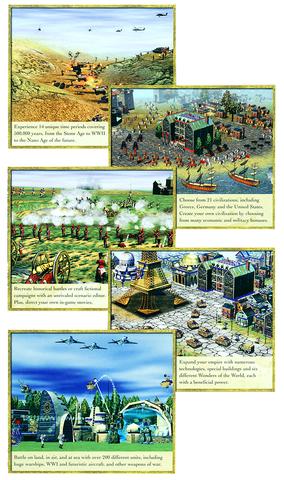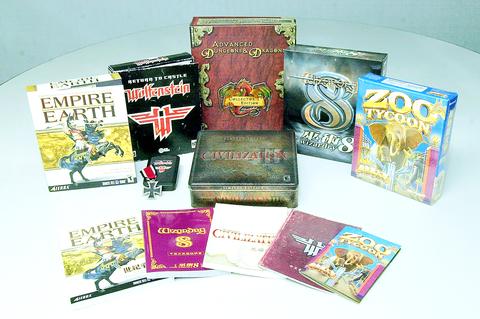With the approach of the Chinese New Year and the winter vacation, Taiwan's PC games industry must gear up for its first battle of 2002. An estimated 30 new games will hit the shelves this season, promising huge improvements and placing almost overwhelming demands on your computer system. With Sid Meier's now classic Civilization going into its third edition and Rick Goodman bringing out Empire Earth, whatever you've got, it probably isn't enough. But for avid gamers, the bigger, better and more realistic options to old favorites will probably be just too good to miss out on.
Looking at recently released and soon to be released games, there is little change in concept this season. It's more a case of the technical upgrading of old ideas. But this in no way diminishes the excitement at the release of Civilization III by Sierra and the new Empire Earth, put together by the same team that brought out Age of Empire and Age of Kingdom. Four years in the making, Empire Earth has been highly praised by PC Gamer magazine, for combining the epic scope of Civilization with the real-time strategy format of Age of Empire.

IMAGES COURTESY OF UNALIS
But this comes at a price. To get the best of the 3D effects, and the games' ability to marshal thousands of units on the battlefield, gamers are going to need top-of-the-line equipment and the patience to work through an instruction manual 230 pages long.

PHOTO:CHIANG YING-YING, TAIPEI TIMES
"[With all the effects turned on], even a computer with a 1.2GHz CPU, an advanced chip video card and 256MB of RAM experienced lag time during tests," said Chen Chih-hao (
But the scope of Empire Earth, with its time span of 500,000 years, goes far beyond anything previously achieved in the real-time strategy format. Given the diverse cultural and technological levels encompassed in the game, military units have been calibrated to reflect different levels of technological capability.
"For example, units such as aircraft carriers or nuclear armed bombers can make a decisive difference in the game," Chen said, "and at other stages of development, a machine gun or canon will decide a battle. You will no longer have ludicrous situations where spearmen are able to overpower a tank [as could happen in earlier versions.]"
The battle behind the scenes of Empire Earth was almost as dramatic as anything the game has to offer.
In the second half of 2000, Unalis, which has distributed previous Sierra games, was faced with a strong bid from Chinasoft Group for the distribution rights to Empire Earth. In fact, at the Taiwan International Computer Show in December of the same year, Chinasoft was already promoting the game and demo versions were already released. At the time, Unalis vice president Wu Shoou (
At the computer show last August, Chinasoft was still promoting the game through its magazine and Internet cafes, but by December the tables had turned, and Unalis announced at a press conference, at which representatives from Sierra were present, that it would be the official distributor of the game. According to a member of Unalis' distribution department who wished to remain anonymous, this was because Unalis had simply changed the rules. Instead of bidding for distribution rights, it guaranteed Sierra sales by buying the games outright. "The sale of the English versions has already reached target, and of the 70,000 Chinese-language sets, we will sell them by March or April," he told Taipei Times.
Civilization III, while remaining true to its fundamental strategy orientation, has built on strengths, namely in providing more realism in concept rather than in graphics.
"Sid Meier is a close observer of human development. In Civilization III, at a certain level of development cultures have a powerful influence on the land around them, and they are even able to take over their neighbor's land or cities through non-military means," said Antonio Lu (呂維振), chief editor of the Gamebase Web site.
Additions such as the "cultural circle" and new rules for the development of leaders and the possibility of coordinated military action add greater realism and complexity to the game. Considerable effort has been put toward making the interface more intuitive, but for all that, the Chinese-language handbook runs to 196 pages and is not for the faint of heart. Distributed by Inforgames Taiwan, Civilization III was released in Taiwan last October to positive reviews.
The current hype over Harry Potter and Lord of the Rings has helped boost games with a fantasy theme. Electronic Arts (
Baldur's Gate, which has already proved popular with role-playing gamers, gained wider popularity from this collateral hype. Interwise, the game's distributor, has gradually been making Chinese editions of Baldur's Gate and its other role-playing games. According to Interwise vice president Dell Wu (
The strongest competition for this Dungeons and Dragons' anthology comes from another series, Wizardry, which is now in its eighth edition. It has been a seven-year wait since the last edition, and will provide veteran gamers -- many of whom have fought their way from their teens to early 30s on the game -- with richer colors, superior graphics and a much wider fantasy world in which to find adventure. Wizardry 8, which has been completely localized -- both handbook and interface are in Chinese -- is selling for less than NT$1,000, less than its English-language counterpart. For collectors though, the simpler packaging is not up to the standard of imported games, and the local version of Wizardry 8 looks decidedly shabby compared to the intricate designs and saturated colors of its rivals.
In the realm of first-person shooters, a number of new games have come to claim the throne from Counter Strike, the most notable being Return to Castle Wolfenstein, which is already on the market, and Medal of Honor: Allied Assault, which will reach the shops in two weeks. Castle Wolfenstein's atmospheric backdrop is derived from the film Enemy at the Gate and to position the game more advantageously against the still-popular Counter Strike, Unalis, its distributor, released a stand-alone version of the game last December and is already hosting free demo sessions in its Internet cafes.
Medal of Honor draws its inspiration from another movie, Saving Private Ryan, from which its takes its narrative backdrop. According to US-based Electronic Arts, the game's dialogue and interface have been translated into Chinese so that, as one game tester pointed out, local players will no longer get killed off simply because they don't fully understand the on-screen instructions.
Each game has its own special appeal. Castle Wolfenstein allows players to take on the role of different military specialists (infantry, engineer, medic and lieutenant), which offers potential for a higher level of cooperation in online group play, a development on Counter Strike. Medal of Honor has the background of a familiar movie and the intimacy of a fully localized package so that non-English speaking gamers can really get into the game.
For gamers who don't really get into the killing, and with a special appeal to Taiwan's city-strapped youth, there is Microsoft Taiwan's Zoo Tycoon, which has an interface totally in Chinese. For kids who might have to queue for hours just to get a glimpse of koalas or king penguins at Taipei's Mucha Zoo, this is a godsend. Bring up your own koala, elephant or other animal -- and of course there is an extensive encyclopedia, making the game educational as well.
"In the past, these games have been dedicated to building theme parks or cities. The aim has generally been to please visitors and make money," said Gamebase editor Lu, "but with Zoo Tycoon, it is to make the animals happy, and only then to make zoo visitors happy. I think people will really put a lot more effort into this."
For every taste, the games are already out there. Just make sure that you have upgraded your video card for the holidays.

May 26 to June 1 When the Qing Dynasty first took control over many parts of Taiwan in 1684, it roughly continued the Kingdom of Tungning’s administrative borders (see below), setting up one prefecture and three counties. The actual area of control covered today’s Chiayi, Tainan and Kaohsiung. The administrative center was in Taiwan Prefecture, in today’s Tainan. But as Han settlement expanded and due to rebellions and other international incidents, the administrative units became more complex. By the time Taiwan became a province of the Qing in 1887, there were three prefectures, eleven counties, three subprefectures and one directly-administered prefecture, with

Taiwan Power Co (Taipower, 台電) and the New Taipei City Government in May last year agreed to allow the activation of a spent fuel storage facility for the Jinshan Nuclear Power Plant in Shihmen District (石門). The deal ended eleven years of legal wrangling. According to the Taipower announcement, the city government engaged in repeated delays, failing to approve water and soil conservation plans. Taipower said at the time that plans for another dry storage facility for the Guosheng Nuclear Power Plant in New Taipei City’s Wanli District (萬里) remained stuck in legal limbo. Later that year an agreement was reached

What does the Taiwan People’s Party (TPP) in the Huang Kuo-chang (黃國昌) era stand for? What sets it apart from their allies, the Chinese Nationalist Party (KMT)? With some shifts in tone and emphasis, the KMT’s stances have not changed significantly since the late 2000s and the era of former president Ma Ying-jeou (馬英九). The Democratic Progressive Party’s (DPP) current platform formed in the mid-2010s under the guidance of Tsai Ing-wen (蔡英文), and current President William Lai (賴清德) campaigned on continuity. Though their ideological stances may be a bit stale, they have the advantage of being broadly understood by the voters.

In a high-rise office building in Taipei’s government district, the primary agency for maintaining links to Thailand’s 108 Yunnan villages — which are home to a population of around 200,000 descendants of the Chinese Nationalist Party (KMT) armies stranded in Thailand following the Chinese Civil War — is the Overseas Community Affairs Council (OCAC). Established in China in 1926, the OCAC was born of a mandate to support Chinese education, culture and economic development in far flung Chinese diaspora communities, which, especially in southeast Asia, had underwritten the military insurgencies against the Qing Dynasty that led to the founding of